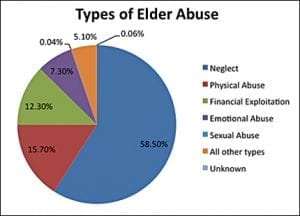![]()
Main Street Medical Monthly Digest
World Elder Abuse Awareness Day
By Kelsey Rolfe June 4 2019
What is World Elder Abuse Awareness Day?
This month on June 15th is World Elder Abuse Awareness Day. It is a day that is meant to educate the community about such an important issue and what everyone can do to keep themselves and their family safe.
In 2017 11,380 cases of abuse against elderly people, between the ages of 65 and 89 years of age, were reported to the police here in Canada, not including the hundreds that go unreported to authorities. Higher rates of abuse were shown to be amongst rural areas rather than more urban communities. One third of these victims were abused by members of the family, however, abuse can happen at the hands of in, or out, of home workers as well.The key to keeping loved ones safe is for both the family and the potential victim to be well informed and educated on what elder abuse can look like and what steps to take if abuse is suspected.
 Types Of Elder Abuse:
Types Of Elder Abuse:
- Physical Abuse: Hitting, striking, pushing, shaking, burning, and harm caused by over and under medication are all actions against seniors that can result in both minor or major injuries.
- Psychological: Emotional abuse including, insults, threats, humiliation, isolation, and intimidation can all lead to lasting anxiety, depression, and a decrease in self-worth among elderly people. Making sure emotional support or someone to talk to is important in reducing the effects of emotional abuse.
- Financial: Misusing or stealing someone else’s assets, property, or money, as well as cashing cheques without someone’s permission, pressuring them to change or sign a will / legal document, and sharing an elders home without paying a fair share of expenses are included in the financial abuse of an elder. It is easy for this to happen within a family and can sometimes go undetected by the elder themselves.
- Neglect: By not providing adequate food, water, shelter, clothing, or medication to an elder person under someone else’s care they are being denied their basic needs and necessities. This kind of abuse can result in both physical and emotional consequences.
The Signs and Symptoms of Elder Abuse:
Signs to look for:
- High levels of anxiety or depression
- Unexplained injuries

- Poor Hygiene
- A lack of trust
- Confusion regarding new legal documents
- Sudden changes in personality/behaviour
Seniors that are being abused may be embarrassed or reluctant to talk about their situation due to the fear of anger or retaliation from the abuser, and some may not know they are being mistreated at all. It is important that all elders have someone they trust available to confide in.
What To Do:
- Make sure all potential victims are aware of what elder abuse can look like and what forms it can take
- Ensure that they are comfortable with who they are around daily and where they are living
- Always make sure they have someone who they can talk to. Like a trusted family member, close friend, family doctor, neighbour, etc
- Have emergency numbers and phones easily accessible
Elder abuse is a common and often forgotten form of abuse within a community and is suspected to rise in frequency as the age of the world wide population increases. Actions must be made in order to protect elderly individuals and safety and security for yourself and others should be a top priority.
